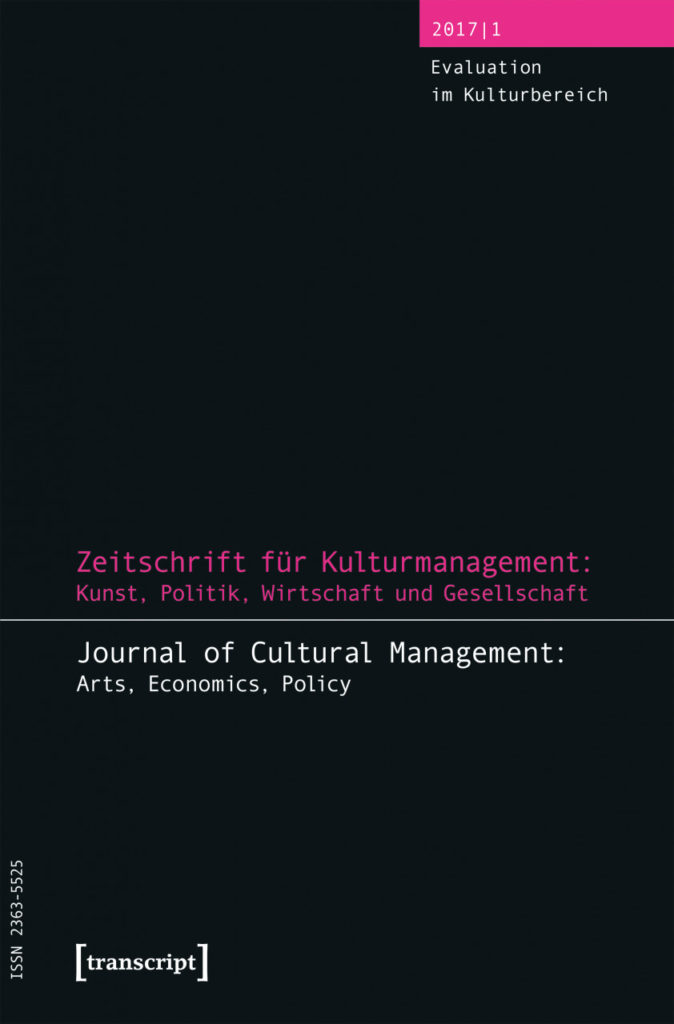Case Study
Die Entwicklung eines Wirkungsziel-Managementsystems am Nationaltheater Mannheim
Abstract
In Germany, many of the traditional municipal theaters do not recognize the benefits of applying a quality management system, strategic planning process or evaluation models. A fundamental problem for theaters relying on public funding is that the funding body’s trust in the theater does not make provision for any form of intervention in case of mismanagement by the theater’s leadership team. However, all parties involved share a common interest in ensuring the theater’s success both artistically and in terms of its social impact. Based on the example of the Nationaltheater Mannheim, we describe the strategic planning process we have applied since 2013 in combination with a multiple directors’ model. We outline a strategic planning process initiated by the municipality, which leads to mutually beneficial outcomes for both parties – municipality and theater. The framework consists of processes for establishing and transparently communicating five strategic goals and strategic key performance indicators, and measures which ones are adaptable from season to season. The strategic goal-planning approach, supported by the municipality’s overall change management approach, results in self-evaluation methods that include quality management, as a basis for the strategic steering of the theater management.
Keywords
2017 (1)
Evaluation im Kulturbereich

Related Articles
Kulturfinanzierung, Governance und Demokratie
Mehr Partizipation wagen?Journal of Cultural Management 2015 (1)
Research Article
Journal of Cultural Management 2015 (2)
Research Article
Journal of Cultural Management 2019 (2)
Research Article
Journal of Cultural Management and Cultural Policy
Essay
Journal of Cultural Management and Cultural Policy 2024 Journal of Arts Management and Cultural Policy 2020 (1)
Case Study
Journal of Cultural Management and Cultural Policy
Research Article
© 2026, Journal of Cultural Management and Cultural Policy
Keywords
- Aesthetics
- Higher Education
- Cultural Diplomacy and Foreign Cultural Policy
- Occupation
- Career and Professional Role
- Audience Development
- Audience Studies and Visitor Studies
- Visitor Motivations
- Business
- Covid Pandemic
- Democracy
- Digitalization
- Diversity
- Third Sector
- Empirical Aesthetics
- Development
- Ethics
- Evaluation
- Field Theory
- Festival
- Film
- Federalism
- Community Arts
- Societal Change
- Ideology
- Staging
- Career
- Communication
- Concert
- Creative Industries
- Creativity
- Crisis
- Culture
- arts organizations, cultural organizations
- Cultural Participation
- Cultural Change
- Fincancing The Arts
- Cultural Promotion Law
- Cultural History
- Cultural Management
- Cultural Economy
- Cultural Organizations
- Art Education
- Cultural Policy
- Cultural Production
- Cultural Sociology
- Art Education
- Cultural Understanding
- Arts Administration
- Cultural Industry
- Cultural Sciences
- Art
- Art Field
- Arts Research
- Artists
- Artistic Research
- Artistic Reputation
- Arts Management
- Arts Organizations
- Art education
- Arts Marketing
- Arts Administration
- Curating
- Leadership
- Literature
- Advocacy
- Management
- Marketing
- Market
- Media
- Methods Development
- Mexico
- Monumentalizing
- Museum
- Music
- Non-Visitor Studies
- Opera
- Orchestra
- Organization
- Political Expression
- Post-truth Politics
- Professional Role
- Audience
- Audience Development
- Law
- Government
- Role
- Socially Engaged Art
- Social Cohesion
- Social Change
- Social Cohesion
- Non-visitor Socio-demographics
- Socioculture
- State
- Symbolic capital
- Dance
- Participatory Justice
- Theatre
- Theatre Governance
- Theory Development
- Tourism
- Transformation
- Survey
- Entrepreneurship
- Urbanism
- Civil Society


